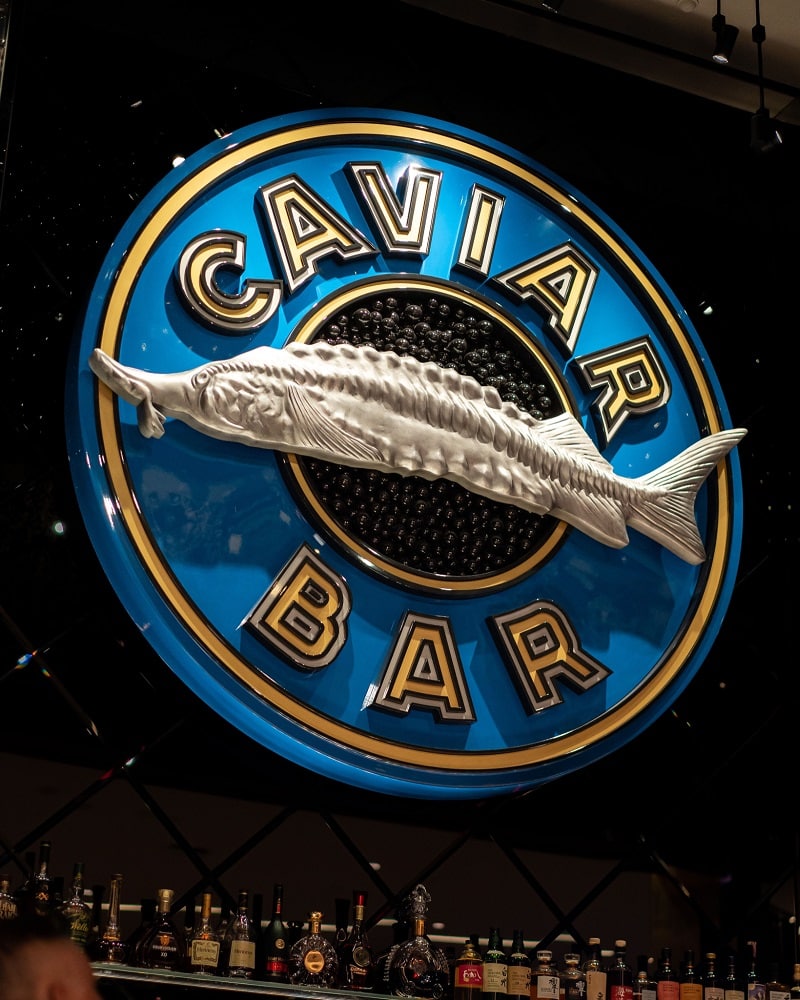Seafood 101:
10 Health Benefits of Salmon
If you are looking to add more seafood to your diet for its health benefits, salmon is an excellent choice. This superfood is packed with many elements like omega-3 fatty acids, protein, B vitamins, and selenium. The health benefits of salmon and all these properties make it a very nutritious source of food.
Is salmon healthy?
Yes, salmon is incredibly healthy. Eating healthy seafood options regularly has been linked to numerous health benefits. With its unique combination of valuable nutrients, it’s no wonder that nutrition experts widely praise salmon as one of the most advantageous food sources available.

Book a reservation to enjoy world-class delicacies and seafood dishes featuring salmon at Aqua Seafood & Caviar Restaurant.
What are the health benefits of salmon?
# 1. High in nutrients
Salmon is an excellent source of many essential nutrients, including protein, omega-3 fatty acids, B vitamins such as niacin and Vitamin B12, selenium, potassium, magnesium, and phosphorus. Eating salmon regularly can provide your body with these essential nutrients, which can improve overall health.
# 2. Heart health
One of the most widely praised benefits of consuming salmon is its positive effect on heart health. Omega-3s found in salmon can help lower triglyceride levels, types of fat associated with an increased risk for heart disease. Omega-3s also reduce plaque buildup in your arteries. This helps protect against stroke and other cardiovascular illnesses that lead to death in both men and women across the globe.
# 3. Brain function
Research shows a correlation between eating fish high in beneficial fats — like salmon — and better cognitive functioning. Studies suggest this benefit may even help reduce symptoms related to Alzheimer’s Disease or dementia by slowing down age-related brain decline.
# 4. Vision support
Due to its higher concentrations of omega-3 fatty acids compared to some other varieties of seafood, salmon may enhance vision care significantly due to its anti-inflammatory properties. This can help reduce ocular concerns such as dry-eye syndrome, macular degeneration, or glaucoma.
Additionally, research has shown that regular consumption could slow the development of or progression rates for specific forms of age-related macular degeneration (AMD) when incorporated into a nutritious diet.
# 5. Improved bone strength
Salmon is rich in minerals like calcium and phosphorus, the key players responsible for strengthened bone density throughout our bodies. Regular intake could aid tremendously in slowing and preventing osteoporosis by strengthening joint tissue and providing protection through dense antioxidants found within salmon.
# 6. Repairs tissue damage
Salmon is an excellent source of omega-3 fatty acids necessary for healthy cells and tissue growth. These essential fatty acids can help to heal tissue damage and keep existing ones healthy. The antioxidants in salmon may also be beneficial in protecting cells from the damage caused by free radicals that contribute to aging, disease, inflammation, and other ailments.
# 7. Improves thyroid function
Salmon is rich in selenium, an important mineral required for proper thyroid function. Consuming selenium helps regulate hormone production in the thyroid as well as metabolism and digestion. Selenium may also play a role in strengthening the immune system and reducing inflammation throughout the body.
# 8. May reduce risks for certain cancers
Evidence suggests that eating salmon can reduce the risk of certain cancers. This could be due to the omega-3 fatty acids, selenium, and vitamin D found in this fish. Eating a diet rich in these nutrients could offer some protection against cancerous cells.
# 9. Improves the skin
Since salmon is rich in omega-3 fatty acids, it could improve the look and feel of the skin due to its anti-inflammatory effect. These essential fatty acids can promote a healthy glow by keeping cells nourished and hydrated.
# 10. Weight loss and weight management
Salmon is an excellent source of lean protein, which helps satiate hunger for longer periods, leading to improved feelings of fullness after meals. This can help when you are regulating calorie intake to lose weight or maintain a healthy weight. The omega-3 fatty acids found in salmon could also help promote fat loss by decreasing the storage of body fat and increasing metabolism levels.
Is salmon skin healthy?
Salmon skin is edible and can be a nutrient-dense addition to your meal. It contains omega-3 fatty acids, protein, vitamin D, selenium, magnesium, zinc, niacin (B3), and more. Eating salmon skin may help reduce inflammation and support cardiovascular health.
Additionally, some studies have suggested that consuming salmon skin might even reduce the risk of certain types of cancer. When purchasing salmon for cooking at home, make sure to buy Wild Alaskan Sockeye or Atlantic Salmon, as these varieties contain higher levels of omega-3s.
Does salmon have fiber?
Surprisingly, salmon is a great source of fiber. Wild-caught salmon contains about 0.8 grams of dietary fiber per 3-ounce serving, while farmed versions contain about 1 gram. Eating salmon regularly can help you reach your daily recommended intake of 25 to 38 grams of fiber.
This versatile fish also provides dietary fiber to help keep our digestive system healthy. Fiber also helps control cholesterol levels and provides essential fuel for probiotic bacteria in the gut, making it an underrated but invaluable component of a well-rounded diet.
Can salmon be eaten raw?
Yes, salmon can be eaten raw, but only if it is specifically labeled for sushi or sashimi. This type of salmon is treated with a freezing process that kills parasites, so it is safe to consume raw. If you are unsure whether your salmon has been properly frozen, do not risk it and opt for cooking the fish instead.
What is the proper cooking temperature for salmon?
The recommended internal temperature for cooked salmon is 145°F (62.7°C), which is considered medium-rare. The salmon should be opaque and flake apart easily when pierced with a fork at this point. To ensure the fish is cooked to the proper temperature, use an instant-read thermometer.
What are the carbs in salmon?
Wild-caught salmon contains 0.2 grams of carbohydrates per 3-ounce (85 g) serving, while the carbs in farmed salmon are about 1 gram.
What are the salmon filet calories?
The salmon filet calories are about 164 calories per 3-ounce (85 g) serving for wild-caught salmon and around 200 calories for farm-raised salmon.
Can salmon be paired with caviar?
Salmon and caviar pair well together due to their contrasting flavors. Caviar adds a salty flavor while the salmon balances with its mild taste and slight sweetness. The two also complement each other in texture. The crunch of the caviar complements the buttery smoothness of salmon. When you want an indulgent treat, give this combination a try.
Super salmon, super meals
Salmon is a superfood and a nutritional powerhouse, providing an excellent source of essential nutrients like omega-3 fatty acids, protein, B vitamins, and selenium. Eating salmon regularly has been linked to numerous health benefits ranging from reduced inflammation and better cognitive functioning to improved heart health and even cancer prevention.
With its unique combination of beneficial properties along with its ability to be cooked in multiple ways, this delicious fish should undoubtedly be part of your regular diet for the utmost nutritional benefits.
The best seafood in Las Vegas

When you want the best seafood restaurant on the Las Vegas strip, visit Aqua Seafood & Caviar Restaurant. Our expertly prepared dishes feature only sustainable and responsibly-sourced fish from around the world. Our dishes will tantalize your taste buds with fresh flavors and textures.
Enjoy a unique seafood experience at Aqua Seafood & Caviar Restaurant by booking a reservation today.
Sources:
Dreisbach, S. (2022). 10 Amazing Health Benefits of Fiber.
Natalia. (2022). What Does Salmon Taste Like? Everything You Need To Know.
Omega-3 Fatty Acids. (2022).
